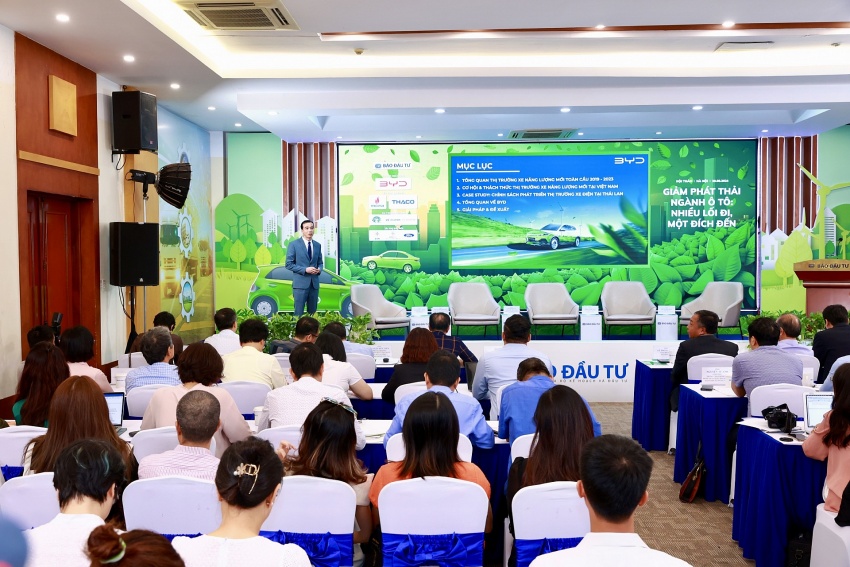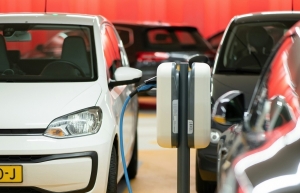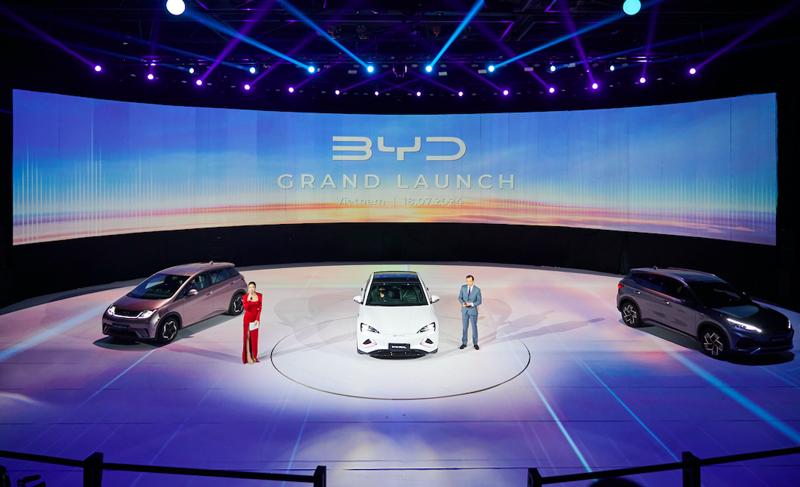Long road ahead to green the vehicle industry
At a conference on reducing emissions in the automotive industry themed hosted by VIR on August 29, those in attendance heard that "green" cars are trendy now all over the world, with significant growth every year.
 |
| Vo Minh Luc - CEO of BYD Vietnam |
According to the International Energy Agency, most electric vehicle (EV) sales in 2023 were in China (making up 60 per cent), Europe (25 per cent), and the United States (10 per cent). These regions account for approximately 65 per cent of total global car sales.
In 2023, the EV market share increased to about 18 per cent, reflecting the strong growth of the EV market recently. By the end of 2024, the EV market share may account for 45 per cent in China, 25 per cent in Europe, and 11 per cent in the US.
Vo Minh Luc, CEO of BYD Vietnam, noted that the company in 2022 stopped manufacturing traditional internal combustion engine vehicles to focus on new energy vehicles. As of July 2024, BYD's cumulative sales in the year reached more than 1.9 million units – and in July alone, BYD sold almost 342,400 units, an increase of 30.5 per cent on-year.
"As of August 11, BYD has contributed to reducing total global carbon emissions by more than 65.2 million tonnes, equivalent to nearly 1.1 billion additional trees planted," Luc said.
In Vietnam, many policies encouraging the development of green vehicles and green transport have been issued such as the green energy conversion programme, reducing carbon and methane emissions in the transport sector, and preferential registration fees for EVs.
Luc said that in addition to the advantages gained from these policies, the development of green transport is struggling with many challenges such as unreasonable planning for charging station development in urban areas, and transport infrastructure not meeting the conversion needs of people.
"Policies supporting people to convert to new energy vehicles have not been strongly implemented, and the roadmap is not clear, especially in big cities. Investment policies for EV ecosystems are still unclear and difficult to lure investors," Luc said.
The practical experiences of regional countries to overcome these challenges are also quite diverse. The Thai government has expanded subsidy policies for battery EVs such as tax reductions, and cash subsidies. Enterprises in Thailand are also exempted from corporate income tax for as many as eight years for pure EV projects and exempted from import tax on EV parts.
For EVs imported from China, the Thai government also supports about $4,000 for each unit sold since 2022 under the ASEAN-China Free Trade Agreement. These policies have raised the proportion of EVs in Thailand sharply.
In China, people using EVs since July this year receive a subsidy of 20,000 yuan ($2,800), double the subsidy announced in April. According to the China Association of Automobile Manufacturers, car sales in the first half of 2024 reached 14 million units, up 6.1 per cent on-year. Fitch Ratings noted that China's EV industry is expected to achieve sales growth of 20 per cent at the end of this year.
The Malaysian government is exempting import duties and excise taxes on EVs for four years. Components for domestically assembled EVs are currently exempted from import duties for six years by the end of 2027. Domestically assembled e-vehicles will be completely exempted for six years. Road taxes for EVs are exempted, and they are expected to account for 80 per cent of total vehicle sales in Malaysia by 2050.
In Indonesia, a development acceleration initiative for road transport with special incentives for localised EVs was crafted in 2019. Specifically, the minimum localisation rate exceeded 40 per cent in 2022-2023; it will be at least 60 per cent in 2024-2029 and at least 80 per cent after 2030. This country aims to sell more than 50,000 EVs in 2024, tripling the 2023 figures.
"BYD enters the Vietnamese market to work with all partners and deliver the latest technologies, products, and the best services. Thereby, users have more choices for new energy vehicles. With the efforts from all parties, the Vietnamese automotive industry will develop more rapidly, and people will easily have green transportation products with modern technologies and reasonable costs," Luc from BYD Vietnam highlighted.
 | Chinese electric vehicle names remain in pole position of market expansion efforts Vietnam is emerging with decent prospects as an electric vehicle manufacturing hub for the region, as Chinese electric vehicle makers from Chery to BYD flock to the country. |
 | Vietnam remains focused on EVs for sustainable growth According to a recent HSBC report, Vietnam is advancing its green energy transition rapidly while prioritising electric vehicles (EVs) as a key driver of sustainable economic growth. |
 | BYD targets openning 100 dealerships in Vietnam within next three years Chinese electric vehicle giant BYD intends to open 100 dealerships in Vietnam within the next three years as part of its aggressive expansion efforts in the country. |
 | Raft of Chinese electric vehicle groups expand into Vietnam Many Chinese brands have unveiled electric vehicles in Vietnam but charging infrastructure remains a significant concern for buyers. |
 | Several Vietnamese banks agree to finance EV purchases A Chinese electric vehicle manufacturer has agreed a deal with several Vietnamese banks to provide favourable financing solutions for customers purchasing its automobiles across Vietnam. |
What the stars mean:
★ Poor ★ ★ Promising ★★★ Good ★★★★ Very good ★★★★★ Exceptional
 Tag:
Tag:
Related Contents
Latest News
More News
- Trung Nam-Sideros River consortium wins bid for LNG venture (January 30, 2026 | 11:16)
- Vietnam moves towards market-based fuel management with E10 rollout (January 30, 2026 | 11:10)
- Envision Energy, REE Group partner on 128MW wind projects (January 30, 2026 | 10:58)
- Vingroup consults on carbon credits for electric vehicle charging network (January 28, 2026 | 11:04)
- Bac Ai Pumped Storage Hydropower Plant to enter peak construction phase (January 27, 2026 | 08:00)
- ASEAN could scale up sustainable aviation fuel by 2050 (January 24, 2026 | 10:19)
- 64,000 hectares of sea allocated for offshore wind surveys (January 22, 2026 | 20:23)
- EVN secures financing for Quang Trach II LNG power plant (January 17, 2026 | 15:55)
- PC1 teams up with DENZAI on regional wind projects (January 16, 2026 | 21:18)
- Innovation and ESG practices drive green transition in the digital era (January 16, 2026 | 16:51)




























 Mobile Version
Mobile Version